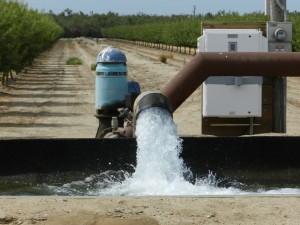
The Modesto Irrigation District (MID) is contemplating rate increases for water and electricity customers. The proposal has raised ire about below market water rates for local farmers. City dwellers argue that they should not have to pay higher rates as long as farmers receive water at subsidized rates.
Any time a government entity provides a subsidy, three possible reasons explain it. First, the subsidy may exist to promote an activity for the public good. Second, the recipient may simply receive a sweetheart deal. Finally and most likely, the government entity may not have accurately figured the cost of the service or product, inadvertently granting a subsidy.
Critics of the MID water rate structure allege that farmers receive a sweetheart deal as a reward for agrarian predecessors building the system in the 1880s. MID has provided water and electricity that have made possible the urbanization of large areas of Stanislaus County. Critics maintain that past generosity should have no bearing on the current rate structure.
Possible Justification for Farm Subsidies
Water subsidies for farmers can be justified. Farmers produce an ultimate social good. Their activity produces food that everyone needs to survive. Keeping agriculture healthy and viable serves the public interest. Lower rates promote productivity and prosperity throughout the community.
Historically, farming has not been known for high profits. Over the years, larger farms with better capitalization and more efficient production methods have replaced many of the small farms of the past. As world demand continues to grow, farming has finally become highly profitable. Low irrigation rates helped sustain farmers through tough times.
As in any business, farmers seek the lowest cost for any product or service the business needs for operation. By keeping surface water rates low, pumping groundwater is minimized. Farmers utilize surface water and leave ground water as a reserve for dry years. If water rates rise, ground water consumption will increase. Raising water rates could have a negative impact on MID’s income from sale of water and adversely affect the groundwater reserve.
Why Water Rates are Higher for Cities
Water rates in the cities are necessarily much higher than in farming areas because much more infrastructure is needed to deliver the product. Also, city water has to be sanitized and upgraded for human consumption. Farm water quality standards are lower, reducing the cost of processing and delivery.
Determining Fair Rates
Local hydrologist Vance Kennedy recently cited a 2004 U.S. Geological Survey report to justify water rates that would be lower than those advocated by MID critics. The report stated that an average of 58 percent of water used in flood irrigation eventually works its way into a ground water table. The water can be reused in the future when needed, so why should farmers pay for unused water?
In computing farm water rates, farmers should be given credit for the water their irrigation method saves for future use. If cities recycled their water, they would deserve similar consideration.
Critics complain that flood irrigation wastes water. However, according to Kennedy, the practice recharges groundwater and removes salts from the surface, keeping the soil fertile and productive. Conversely, drip irrigation does not benefit ground water levels and leaves salts on the surface, eventually ruining the soil for farming.
Ultimately, members of the MID Board of Directors are charged with determining what is fair. No one likes to pay more while the other guy receives a subsidy, especially when the perception is that the subsidy is the consequence of a sweetheart deal.
On the other hand, a legitimate subsidy for the good of the community that can be justified by sound reasoning is much more likely to receive a positive reception. Whatever rate structure the MID Board chooses, they will need to do a great job selling it. In times of water shortages, the sales job is much more difficult.
